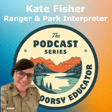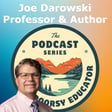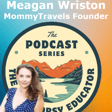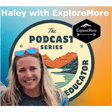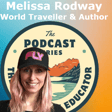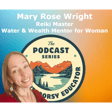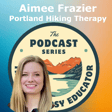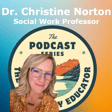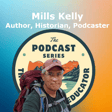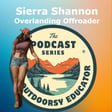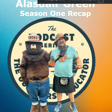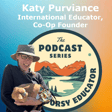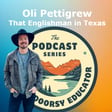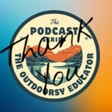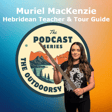Become a Creator today!Start creating today - Share your story with the world!
Start for free
00:00:00
00:00:01

Will "Akuna" Robinson
Join Alasdair and Akuna as we discuss the importance of mental health and the healing powers of the trail.
Recommended
Transcript
Introduction and Sponsorship
00:00:01
Speaker
Hello and welcome to the Outdoorsy Educator Podcast. A place for conversation about travel, adventure, life lessons and making the most out of each and every day.
00:00:14
Speaker
I'm your host Alistair Green and each week I will have a conversation with someone who will not only inspire us all but give us an insight into living life to its fullest.
00:00:25
Speaker
But before we get started, a quick warrant from our sponsor Whole Earth Provision Company.
00:00:38
Speaker
Since 1970, Whole Earth Provision Company has been the Texas outfitter for side quests big and small. Whether you're gearing up for the open road, chasing a trailhead, or hunting for that just right gift, they have got you covered.
00:00:53
Speaker
Think durable clothing, shoes that will actually go the distance, gear that's road trip ready, and books, puzzles, and toys that will spark wonder at every age.
00:01:05
Speaker
You'll find Whole Earth in Dallas, Austin, Houston, and San Antonio, or anytime online at wholeearthprovision.com. And hey, because you're rolling with the Outdoorsy Educator podcast, here's a little extra love.
00:01:19
Speaker
Use the code OUTDOORSYEDU for 20% off your next adventure at Whole Earth.
Meet Will 'Akuna' Robinson
00:01:31
Speaker
you It is a true honour to introduce this week's guest, Will Akuna Robinson. A proud US Army veteran, Akuna found healing and a true sense of home on the trail.
00:01:43
Speaker
His journey led him to an incredible milestone, becoming the first black man to earn the title of a Triple Crowner, completing the Appalachian Trail, the Pacific Crest Trail, and the Continental Divide Trail.
00:01:56
Speaker
But Akuna's story does not stop with his own footsteps. His passions now fuel a greater mission, making the outdoors more accessible, welcoming and inclusive for all.
00:02:11
Speaker
Akuna, welcome to the podcast. How are you today? I'm doing great. I'm doing great. How about yourself? Yeah, doing very well. the We're both in a similar area, which I didn't realize. And the weather's starting to cool off.
00:02:26
Speaker
Fall is around the corner, which is where I tend to thrive when it comes to being in the outdoors and and hiking. this This 90 degree plus weather, I'm ready for it to end.
00:02:38
Speaker
Oh yeah, see. I'm originally from Louisiana, so the heat and humidity is right up my alley. Right. And being from Scotland, we tend to melt when it gets above 70, 75 degrees. So yeah this is a struggle.
Coping with PTSD through Hiking
00:02:52
Speaker
Awesome. but Well, why don't you tell us a little bit about yourself, who you are, um how the the name Akuna came about, a little bit about your story. You know, I'm Makuna. I'm a long-distance hiker. I'm a disabled veteran. I got into hiking as a way to help myself with PTSD.
00:03:08
Speaker
And without ever hiking before, I jumped in the deep end and started with the hike of the Pacific Crest Trail back in 2016. You know, even i though I didn't know what I was doing, didn't have a lot of experience, you know, when people would ask me, what are you going to do about the desert? It's a dry section.
00:03:24
Speaker
It's like, I'm not going to worry about that. We'll figure it out. What are you going to do about the Sierras? Like, I have 702 miles to figure that out. And this went on and on and on. So eventually they're like, yo, you're just not going to worry about anything out here, are you? It's like, no, the only thing I need to know is I'm going in the right direction.
00:03:40
Speaker
That's it. So they started calling me no worries, which turned into the Kuna Matata, which turned into a Kuna. I love that. And when you're talking about the Sierras and the stuff, of course, we're talking about the PCT. Was that that was the first long distance trail you did? yeah That was that that was my first long distance trail, my first hike.
00:03:58
Speaker
You know, my first time staying in a tent other than and in the military. Right. Well, we've got a good friend, good mutual friend, Derek Lugo. It sounds like a very similar start to your, we'll call it hiking career that he had, you know, just decided to go and do it and hit the ground running and hitting it hard and a long distance hike straight away.
00:04:18
Speaker
Yeah, definitely. Pretty much the same scenario there. The same scenario. I love it. Well, you know, in reading a bit about you, and you've already mentioned it, you've talked a bit about PTSD. How did that this you go from that sort to lead you to the outdoors?
00:04:34
Speaker
and What was the link there? You know, ah a lot of people don't know. It actually all started for me 13 years before I actually started hiking. Okay. When I was ah in the U.S. s Army, I was deployed to Iraq in 2003. Okay.
00:04:46
Speaker
And while I was there, people would send gifts and things for soldiers. And one day a book a box came with books in it. And one of the books was a guidebook on the Pacific Crest Trail.
00:04:57
Speaker
So, you know, out in Iraq, I used to read this thing every day thinking, yo, I would rather be there than here right now. You know, one day i would love to go out there and hike this, you know, ah After my military service, I was disabled. I had a lot of doctors telling me what I couldn't and could do physically and my mental state wasn't in the right place. And you know, that carried on for like 13 years until one day when I was pretty much at my lowest point mentally, i was in my room and wild was on TV.
00:05:28
Speaker
And it reminded me of that trail I read about 13 years earlier. So, you know, I did a quick Google search and realized, yes, this is the same trail. Yes. People still hike it all.
00:05:39
Speaker
Yes, there is two permits left two weeks from now. And for some reason, it's like, this is what I have to do in order to get back to where I want to be at. I need to go on this crazy adventure.
00:05:52
Speaker
So that night I started ordering gear, didn't know what I needed, ordered way too much stuff. Two weeks later, I was at the Southern Terminus and haven't looked back. That's amazing. yet I like to read and you know um I probably read three or four books a year.
00:06:08
Speaker
When I read Wild, that's the last book that I've read that I couldn't wait to get home from work. The movie was great. I've really enjoyed the movie, but Cheryl Strayed's biography, it'd be just an incredible, inspiring story.
00:06:24
Speaker
And then the scenery in the movie does really make you just want to um Just get out there. I thought it was beautifully shot. um Now, you so you talk about about PTSD and, ah you know, this is not a world I'm familiar with in the sense of I have never served. So I've not gone through that trauma of PTSD.
00:06:45
Speaker
How do you feel that that relates to being in the outdoors? do you Did you find, I mean, obviously cure is not the word, but did you find as as perhaps a coping mechanism or help you walk through it? I'm not sure quite the right verbiage to use
The Healing Power of Hiking
00:06:59
Speaker
there.
00:06:59
Speaker
You know, I've, Right to begin with, we we never cure PTSD. We just learn how to better deal with it. Right. And ah for me, I think what helped me with with hiking was the fact that it gave me time to kind of work on me.
00:07:15
Speaker
You know, when we're home in our societal norms, we have, you know, family, friends, work, your cell phone going off every 10 seconds with notifications and text messages, you know, so you don't really get a lot of time for self care.
00:07:29
Speaker
And that was something that I really, really needed. But getting out into the outdoors gave me the ability to work on myself more, to think some things out, to come to some ah conclusions on different points of my life, and to be able to practice, you know, becoming social again within a controlled environment. Because, I mean, for those that don't go on long-distance hikes, you know, for a lot of us, we're kind of, say, the weirdos that don't fit.
00:07:55
Speaker
into societal norms as well as other people do. So when we go to trail, we kind of find our family. So we're allowed to be a little off. We're allowed to be a little weird. We're allowed to be a little strange because everyone else is.
00:08:08
Speaker
So I was able to, you know, practice or reintegrate myself into social situations. And that was something I couldn't do at home. Right. And that's something, again, must stress. This is an outsider looking in.
00:08:23
Speaker
But it does seem to me that when people you know leave the armed forces having served their time, it must be so difficult to integrate back into society. And if you didn't have the trail to help you with that, it could have been a very different story for you.
00:08:36
Speaker
Very, very different. You know, it's like... I've loved my time in the military service, but as you said, once that comes to an end, it all stops. And now you have to relearn how to be a civilian. And there is no one there to guide you.
00:08:51
Speaker
You know, you have the veteran affairs that's going to help you with your like your medical situations and filing VA claims. And, you know, if you want a mental health ah mental ah mental health advocates to talk to, but no one teaches you how to re-acclimate to not being a soldier anymore.
00:09:06
Speaker
So it's a struggle for a lot of us. Yeah, it's something that ah my my daughter got married earlier this year to a gentleman who is in the army. So I've been asking him questions about this and it's been so eye opening to me. I mean, he he has friends who are veterans who served five, 10, 15 years.
00:09:26
Speaker
And they get out and they for them, they struggle to integrate back into society and not having somebody essentially tell them what to do. And suddenly they're having to make decisions that they haven't been used to making. And it's opened my eyes, again, as somebody who has never served to the struggle that that must bring upon a lot of people.
00:09:46
Speaker
You know, definitely when you're enlisted, any problem, any issue that comes up, there is someone's job to handle that. So you just find that person and then they walk you into the right path, the right direction.
00:09:58
Speaker
You know, as a civilian, that really doesn't exist. Right. We have to so make our own decisions. And we have a lot of, he almost said it was the burden of choices.
00:10:08
Speaker
You have too many choices in life. And when when you're listening, it's, again, his words, not mine. it's It's kind of black and white in a lot of ways. This is what needs to be done. And you just, you just do it.
00:10:19
Speaker
um In fact, he is currently overseas. And I remember asking him, you know, how are you going to get from A to B, where he was, you know, to where he's going overseas. And this was the day before. And he was like, I've got no idea.
00:10:32
Speaker
i just need to show up at the base at 4 a.m. on this day. I don't know if I'm flying out. i don't know if I'm getting a bus and then flying. i yeah any he wasn't worried about it because that wasn't his thing to worry about.
00:10:45
Speaker
then long as you're enlisted, someone's going to tell you what you need to do. Right. I find that i found that just just fascinating. And... um Yeah, it's it's given me a whole new appreciation for people that not only serve, but when they come out, those who are able to integrate back into society. I had no idea until I would say this last year what a challenge that can be.
00:11:07
Speaker
um And certainly gives me some passion for making sure people have these services. um People that have put their literally put their life on the line um need our support and need our help.
00:11:20
Speaker
um ah When I was at, I can't remember if I met you or not, at AT Trail Days last year or not. I know we were both there. um Seeing various charities who were out there who were sponsoring through hikes for veterans.
00:11:34
Speaker
Yes. Helping supply with money. I don't know if you've if you know of them have ever been involved in them. I wish I could remember their name, but I thought, what a wonderful thing. There's a great organization that's called Warrior Hikes.
00:11:46
Speaker
And they sponsor a lot of veterans for veterans. trips on the AT, the PCT, the CDT. They do things like a sponsor kayaking trips down the Mississippi River. This year they did a cross-country bike ride they sponsored veterans for.
00:12:01
Speaker
In my first year hiking, I actually reached out to them, but they had already made their selections for the year. But they ah they helped me out in getting all of the gear that I needed to get out on trails. So a great, great organization.
00:12:14
Speaker
That's fantastic. Well, I'll try to find their socials, their website, and we'll link them into this episode because that's doing great work. And I'm sure quite literally saving lives and giving people a new lease on life. So that's great work.
Diversity and Allyship in the Outdoors
00:12:29
Speaker
um Changing gears slightly, having a look at your website, um something that's important to you is increasing diversity on the trail or people that aren't necessarily your stereotypical front of backpacker magazine or men's health magazine or whatever is, you know, looking hikers.
00:12:46
Speaker
um div Diversity in the outdoors is also something that's very important to me throughout my career in education. I've always worked in schools with a ah lot of diversity deliberately.
00:12:57
Speaker
it's it's I want to try and make sure we're providing people who've been traditionally underserved with the very best that we can. um so I'd love to hear a bit more about that from you, what you've noticed on the trail, your experiences, and where you see it in the future in terms of diversity and getting different people outdoors.
00:13:14
Speaker
You know, when I first started hiking, I think most hikers just knew me as the black guy. You know, there wasn't any other, you know, black men represented on trail that was a very low Amounts of people from marginalized communities and for a few years I started seeing that get better and better and more and more and say this year on trail.
00:13:37
Speaker
I mean it it was pretty much an explosion, you had people from all kind of walks of life and backgrounds. from different races to different sexualities to different, you know, our body types and sizes. I mean, it's a beautiful thing to see that more people are feeling comfortable and safe in the outdoor community.
00:13:54
Speaker
You know, i I wish I could say i in the future that the outdoor industry itself would get more behind it. You know, we did have a slight movement where it seemed like the outdoor industry was caring more about diversity and fostering it.
00:14:10
Speaker
But it seemed like it only lasted maybe a year during the Black Lives Matter movements with Black Squares. But since then, they have fallen off on the representation and telling the stories of marginalized people in the outdoor communities.
00:14:23
Speaker
And that actually is going to start causing a lot of the participation to back off again because they're not seeing themselves represented. So I hope in the future that the outdoor industry double downs on their efforts and start displaying, representing, and sharing the stories of people from marginalized groups.
00:14:43
Speaker
Yeah, I think it's, I've seen some pushback to that. You know, why do we need to, why is it important to have people that look like this, whether it's skin color, whether it's size, whether it's gender, and somebody who's worked in elementary education pretty much my whole career, and it matters. You know, these seven-year-old kids need to see people that look like them, whatever that might be, represented black.
00:15:08
Speaker
doctors as architects as actors as musicians so they can really say hey you know if that person can do it i can do it and i think we carry that with us however old we get i think it's important to go yeah they look like me at the nine years of long distance hiking and 10 long distance hikes i still get numerous emails from people from marginalized communities saying you know i saw you uh the video merrill did of you or i found you on instagram or heard you in a podcast And you made me believe that this is a possible thing. So I just reaching out to you to let you know, I just completed my first long distance hike.
00:15:43
Speaker
And you know, that's what it's about. I mean, when you feel represented, you're more likely to get involved in these things. And when we're talking about our nature and our environment, the more people that get involved in it, the more care about it. So it's part of our conservation efforts too.
00:15:58
Speaker
Right. I love that you, ah you know, I see it from the elementary school point view, and then you're seeing it way into adulthood. you know That does stay with us, that representation, whatever that looks like, truly, truly does matter.
00:16:12
Speaker
And you're right. I mean, I'm friends with several outdoors influencers that don't necessarily meet the traditional mold. and Excuse me. They've also talked about the fact that things have dropped off. Some of their sponsorship has just dissolved and gone away.
00:16:29
Speaker
it doesn't seem to be as important to certain brands as it used to be. And, you know here's hoping that that will change soon. and we You know, I think it will change eventually. I mean, ah and we are talking about a lot of big businesses, so their bottom line is profit margin. Of course. And, you know, I'm sure they are seeing that profit margin drop off.
00:16:50
Speaker
because they stopped being as inclusive. So eventually they're gonna put two and two together and come back. The question is, is us us as marginalized people are going to allow them to get off that easy. That's really the the question is gonna be.
00:17:04
Speaker
That's a very interesting thought. Yeah, are we will the marginalized communities just welcome them back when open arms, when really they walked away? so it'll be interesting to see.
00:17:16
Speaker
Eventually they'll knock back on us outdoor athletes and the outdoor influencers. And, you know, my hope is, is we stick to our guns and we we ask for true allyship, which means a long term commitment.
00:17:28
Speaker
not you know a little campaign work or a photo shoot. you know So I'm hoping that a lot of us will hold them to being allies. And when they come back, we negotiate long-term contracts. you know We make sure we foster long-term relationships. you know We actually get the commitment that they're saying they're going make in writing.
00:17:48
Speaker
So that's what I'm hoping is is the future. Yeah, and it's you you've brought this up slightly. We were both at PCT Days, what, two weeks ago? And I was just thinking before we got on this call, there let's see, it was the Friday night um you're at the ah but a Thunder Island.
00:18:06
Speaker
Yeah. there's brink With that kind of like a pre-party. And it was almost... Yeah, I mean, you just look around and I love the fact that that diversity in all different ways is the norm in the community.
00:18:20
Speaker
You know, you see people with all sorts of pride, young people, old people, men, women, everybody. And it seems that in the core of the community, that that acceptance is just it's it's everywhere um i certainly didn't see any issues whatsoever um it's a community that embraces everybody and just such a wonderful lovely thing i'm hoping you've had that experience too oh yeah i mean uh i would say 95 of the people i encounter have been welcome and friendly
00:18:55
Speaker
And, the you know, you always have that 5% of bad apples there. There are some things you can't do. I mean, if it exists within the world, if it exists within the country, it is it it does exist in the outdoor community as well.
00:19:06
Speaker
So you do have some you do have some people that represent, you know, all the bad things in your regular day-to-day lives. But it's a lot more limited.
00:19:18
Speaker
So for the most part, all my experiences have been good. Just a few bad apples. But we know we don't stop we don't let them stop us from doing the things that we want to do Yeah. I mean, and I've not done, you know, my life doesn't allow me to do you know long distance hikes for months. I tend to do 100 miles at a time, a couple of times a year.
00:19:37
Speaker
But I've met many, many hikers and many outdoor people, and I've only had one that has made... uh derogatory comments about disabled people and it was it was and it it will stay with me probably forever because of how jarring that was yeah because i think i'd let my guard down a bit and i forgot that the hiking community the outdoor community is not completely insulated like you said from the the real world the the you know the other things that exist um you know i would say in a long distance hike over 2 000 miles i would have two to five different
00:20:12
Speaker
situations that came up that were kind of derogatory. But when you look at that on the grand scheme of a 2,600 mile hike over five and a half to six months, that is nothing, especially living in the southern part of the country.
00:20:25
Speaker
Right, right. Absolutely. Yeah, it exists, but hopefully to a much lesser um extent.
Community and Future Plans
00:20:33
Speaker
um So tell me how you're involved in the outdoor industry. Are you a yeah sponsored athlete? Do you work with companies?
00:20:40
Speaker
You know, how are you involved? I work with different companies. You know, I was a sponsored athlete for Merrill for around eight years. Wow. But they're starting to rebuild their athlete program. So who knows, maybe I'll be back with Merrill again at some point down the road.
00:20:53
Speaker
Right. But I usually ah just do work with companies that understand, like I said earlier, allyship is like, ah you know, if you're that company that I don't know of and you contact me because you want Black History Month work, then no, I don't work with you. Not interested. Prior to that, I need the long term commitments.
00:21:11
Speaker
But, ah you know, people like Sawyer, I've done work with ah various different ah backpacking companies that were represented at PCT Days. Right. And, you know, kind of just do what I do. I keep hiking. And, you know, if someone wants to work with me, they pitch an idea and we go from there.
00:21:29
Speaker
I love it. And then but you've been, you know, obviously involved in the outdoor community for 15 years at this point, 10 or 15 years. What would you say outside of the companies, you know the people that you meet, the people at PCT days, this over the hiking community, what do you feel that they have given to you?
00:21:47
Speaker
um And they, they restore your faith in humanity. You know, it was like when we're at home, Negative energy is everywhere. You can't turn on your news without seeing all the negative going on in the world.
00:22:00
Speaker
You can't get into your social media without all the negativity and the call out culture and ah the cutoff cultures and all that that. But when I'm around the outdoor community, those things don't matter anymore.
00:22:13
Speaker
You know, it's all about us being the same team trying to accomplish the same goal as safely and as fun as possible. So we're like each other's biggest cheerleaders, you know, and that positive energy is contagious. I mean, when you come out there, and maybe you're a little afraid.
00:22:29
Speaker
Maybe you're a You're a little grumpy, but people's positive energy, you absorb it, you know, i and if you're surrounded by it, you become more positive. So I think they they they've increased my faith in humanity and they help me whenever I need to to remember that, hey, you can choose to go through life with a positive you know outlook versus a negative one.
00:22:52
Speaker
I love that. And that's exactly my experience. You somebody who hikes a hundred miles at a time that, you know, a few times a year, a lot of the gear and stuff at like PCT days isn't really marketed for me.
00:23:05
Speaker
You know, I i don't need a tent. I don't need to spend hundreds on a tent that weighs three ounces lighter because in the grand scheme of things, that's not for me. But like I flew up there because it does, it restores my face, it's the people.
00:23:18
Speaker
I love the people. I love talking to people. I love hearing the stories. It's why I did this podcast. um The gear and all of that stuff's cool. Like, you know, seeing all the things that are coming out, the innovations, being able to support small business is wonderful.
00:23:33
Speaker
But I just love the positive energy. And you're absolutely right. It's very restorative. yeah That's how I know it's time for me to get back on trail. Right. You know, when it's just seems like negative clouds are everywhere. It's like, yep, I need my community now. It's time for me to go on a hike or I need to go to 80 days or PCT days or CDT days or something.
00:23:55
Speaker
Yeah. My wife always calls me out. She's like, you're starting to get grumpy. It's time to pack the tent up. and You know, she's like, you need to take a few days, come back, you know, restore yourself and come back. It's like my better half says the same. She knows she's also a triple crowner. So she knows like, yep, you need to get out there.
00:24:13
Speaker
Yeah, yeah, she knows that that's like my my medicine, you know, that's that's what I need. So as we kind of, you know, start to wrap this up, what does the future hold for you? What do you see in the next year, five years, 10 years? What's going to happen for Akuna?
00:24:26
Speaker
You know, I'm hoping in within the next year to be relocating to the Pacific Northwest. and You know, something I've thought about since the first time I ever hiked through Oregon, mean, the Pacific Northwest is beautiful.
00:24:39
Speaker
There's more trails and more things for me to explore there versus being down here in the south as a long distance hiker. Right. And, you know, eventually I'd like to buy some acres of land close to the PCT, build my homestead, you know, so i start providing more services for long distance hikers.
00:24:55
Speaker
You know, I mean, a lot of the last few years of my ah my career has been about trying to give more back to this community. That's really interesting. My wife is not a hiker, but enjoys the community aspect of it.
00:25:09
Speaker
And she has talked ah before about like a retirement plan would be building a you know homestead or home near the trail. So I can hike and her love language is food.
00:25:20
Speaker
And she's like, she just wants to cook for through hikers and be a trail angel full time in retirement. It's what it's going to take to keep this community, you know, what it is, the positive energy is, is going to take us, you know,
00:25:33
Speaker
Being the trail angels, you know, and being those guides for the new people coming in and out, because every year more hikers are coming on these long distance trails and they have to learn from some someone.
00:25:46
Speaker
And a lot of the times, you know, their introduction to long distance is hiking, especially the last two ah two years of the quote unquote bad butts, you know, I'm going to go hike 40 miles a day and I got to act tough and hard, but you don't have to be that.
00:26:00
Speaker
You know, you can be the the hiker that hikes 15 miles and just has a very, very good time. You know, the one that just spreads good energy to everyone around them. So that's part of the reason why we wanted to do this in Oregon area is to be there to help foster the next generation of long distance hikers, you know, make sure they start off on the right foot.
00:26:20
Speaker
Yeah, you're absolutely right. I mean, with when I started getting involved in this community, I felt like a bit of an imposter because I hadn't, I wasn't the guy walking 2000 miles and able to take six months off of work and all of that.
00:26:31
Speaker
But then realized very quickly that I was the only person who thought that. um And Derek, our mutual friend, actually kind of called me out a little bit. He's like, you're almost like apologetic. Yeah.
00:26:42
Speaker
for not having walked 2,000 miles that's ridiculous and I was like yeah um I felt like i had that imposter syndrome but really none of that matters just getting out on the trail looking out for people you know maybe some trail maintenance it doesn't matter if you're on a 2,000 mile hike or a 20 mile hike I've had this same conversation with Andy you know Andy films and hikes uh oh yeah that PCT days is a couple of years ago and he's like ah feel like I'm Don't belong here. I'm not the right place. It's like, dude, you're you're part of the family.
00:27:13
Speaker
You know, i just because you don't hike 2000 miles in a season doesn't it make you less than you're you're a part of us. Well, yeah, big shout out to Andy Neal. I'm a big fan of his. and Oh, yeah. i love Andy. Love Andy.
00:27:26
Speaker
Yeah, happened to coincidentally find him online the week that the Hiker podcast that he did came out. It's years ago now. Oh, yeah. And we've stayed in touch. and um Yeah, just a good guy doing doing good things. So I'm glad to hear that you've met him. with things If yeah y'all need a shot at some positive energy without hiding the frustrations of lives, go see Andy Neal, definitely.
00:27:50
Speaker
Yeah, yeah, big fan. um Well, yes, we kind of wrap this I've got three questions I'd like to ask you. um what's What's some advice you would give your younger self? ah of My younger self, it would be ah something I tell people now. It's like, don't let anybody steal your joy.
00:28:07
Speaker
You know, protect your joy. If you want to do something, don't let people talk you out of it. Don't let people, ah you know, alter your mood, alter your decisions. You know, just find your joy and stick with it.
00:28:20
Speaker
I love that. um And then secondly, what does success
Redefining Success and Dream Hiking Partner
00:28:24
Speaker
mean to you? And how do you think the definition of that word has changed for you throughout your life? Success for me isn't exactly completing a goal.
00:28:35
Speaker
You know, like sometimes people on long distance hikes go out and they say, hey I didn't make it to the end. it was a failure. for me is, did you enjoy your time and did you put yourself into it?
00:28:46
Speaker
If you can say yes to those questions, it was a success. If you learn something from that time, it's a bonus. I love that. That's a very good way of a good perspective on the world. I like that.
00:28:58
Speaker
um And then finally, if you could hike 10 miles with anyone in the world, it could be somebody in your life, somebody famous, somebody with us, somebody not with us, 10 miles, anyone from history, who would it be?
00:29:12
Speaker
You know, I think this is going to mess some people up, but I think I would hike with Woody Harrelson. I feel like there would be stories for days and there would be so many things that were comical, but I also feel like there would be so many things that would be educational.
00:29:28
Speaker
You know, he just seems like a very well-rounded person. So I would love to hike with Woody Harrelson. Absolutely. and I love that if we gave listeners a thousand guesses, nobody would have guessed that. That's awesome.
00:29:39
Speaker
Well, if people want to follow you online, ask you questions, find out more about you, where can they find you? You can find me on Instagram on Akuna Hikes. or You can go to my website, which is akunahikes.com.
00:29:50
Speaker
You know, i reach out. I love to talk. And if you have any questions, you're trying to get in the outdoor community or PTSD things, please hit me up. Awesome, man. Well, Akuna, we really appreciate your time. We look forward to seeing you know you out on the trail in the fall, following you on Instagram, and seeing what adventures you're up to next.
00:30:08
Speaker
All right, um man. I appreciate you for having me, fam. Absolutely, brother. Thank you so much. No problem.
00:30:16
Speaker
Thank you again to this week's guest and I hope today's episode was as enjoyable for you as it was for me and perhaps even inspired your next adventure. If you did enjoy the show, please be sure to subscribe, leave a review or follow us wherever you get your podcasts.
00:30:32
Speaker
You can find more information at theoutdoorsyeducator.com or follow us on Instagram, TikTok or Facebook. Until next time, thank you so much for listening to The Outdoorsy Educator Podcast.
